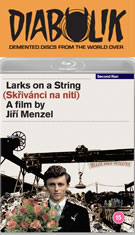
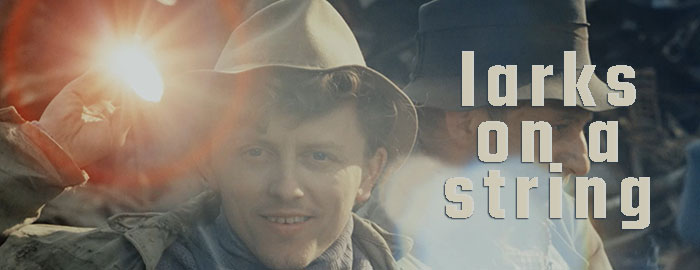
Color, 1969, 95 mins. 54 secs.
Directed by Jiří Menzel
Starring Rudolf Hrusínský, Vlastimil Brodský, Václav Neckár, Jitka Zelenohorská
Second Run (Blu-ray & DVD) (UK R0 HD/PAL)
/ WS (1.66:1) (16:9)
A 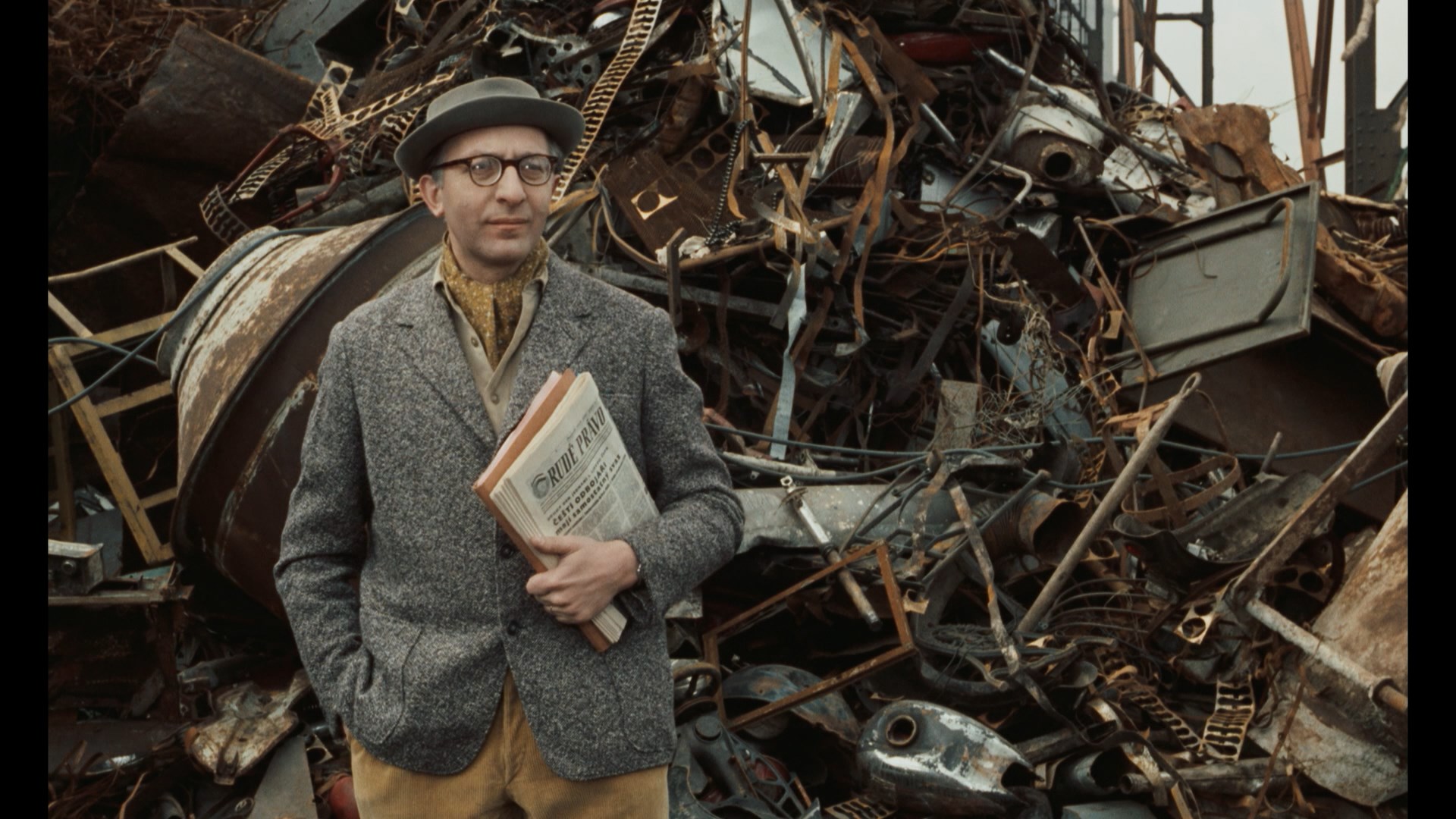 leading light among the Czech New Wave thanks to his Oscar-winning 1966
leading light among the Czech New Wave thanks to his Oscar-winning 1966 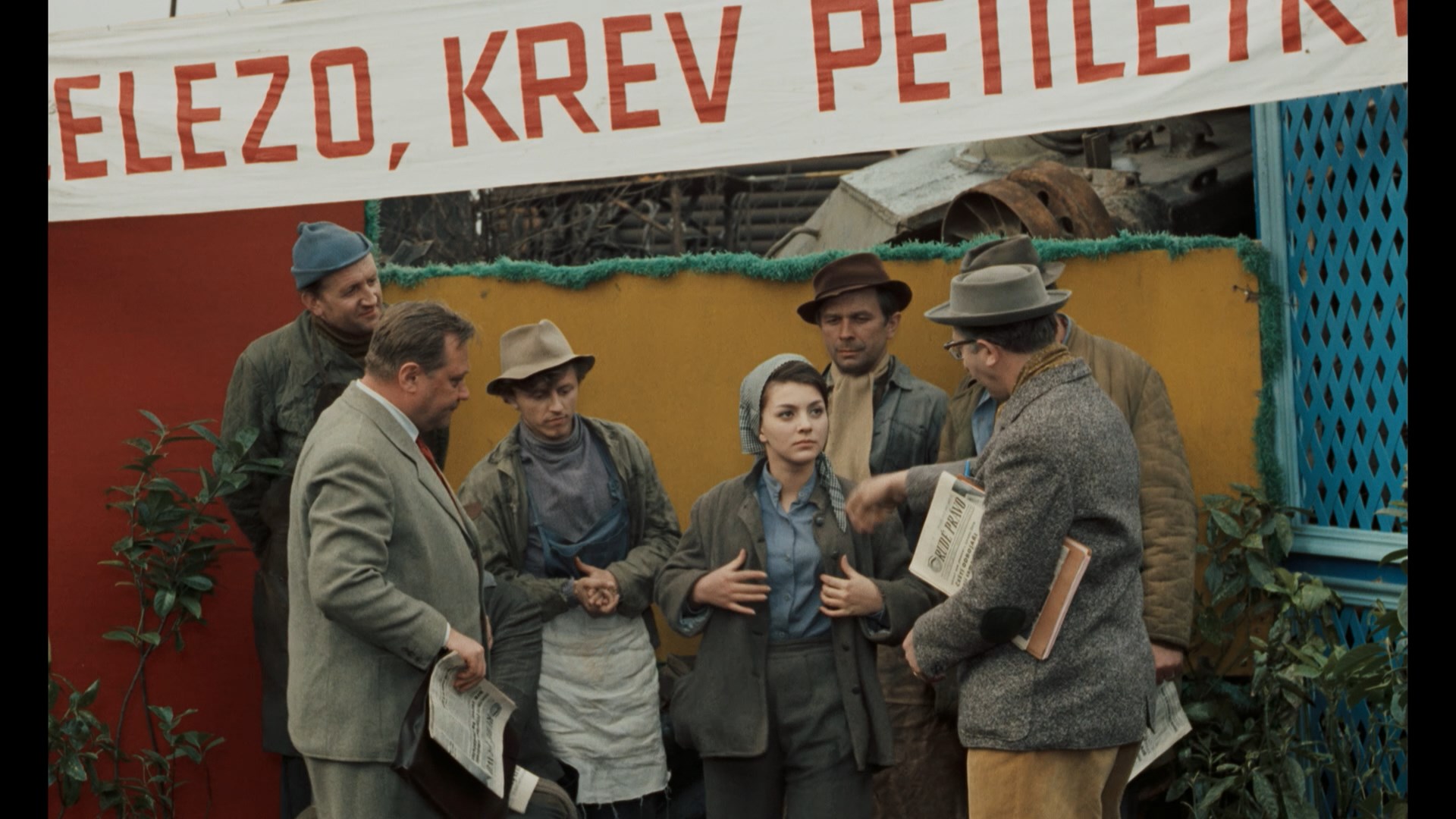 classic Closely Watched Trains, filmmaker Jiří Menzel fell afoul of local authorities like many of his peers at the end of the decade. A satirical look at the more pulverizing aspects of Communism, Larks on a String was a victim of extremely bad timing in 1969 with the government outright banning it until its eventual official release in 1990 premiering at the Berlin Film Festival. Attempts to cut the film to make it more palatable didn't work, but eventually the fully uncut version was reassembled and has been fully restored to take its place among his body of work with other films like Capricious Summer. This film marked one of multiple Menzel collaborations with writer Bohumil Hrabal, in this case weaving together several of his anti-Stalinist short stories.
classic Closely Watched Trains, filmmaker Jiří Menzel fell afoul of local authorities like many of his peers at the end of the decade. A satirical look at the more pulverizing aspects of Communism, Larks on a String was a victim of extremely bad timing in 1969 with the government outright banning it until its eventual official release in 1990 premiering at the Berlin Film Festival. Attempts to cut the film to make it more palatable didn't work, but eventually the fully uncut version was reassembled and has been fully restored to take its place among his body of work with other films like Capricious Summer. This film marked one of multiple Menzel collaborations with writer Bohumil Hrabal, in this case weaving together several of his anti-Stalinist short stories.
At a junkyard established next to a railroad with only sparse living quarters, the more expendable members of middle class in the wake of World War II including a lawyer, a philosophy professor, a librarian, and a musician, where they're all intended to be remolded into model, productive citizens. Everything from scrap metal to the pages of banned books is grist for their labor, 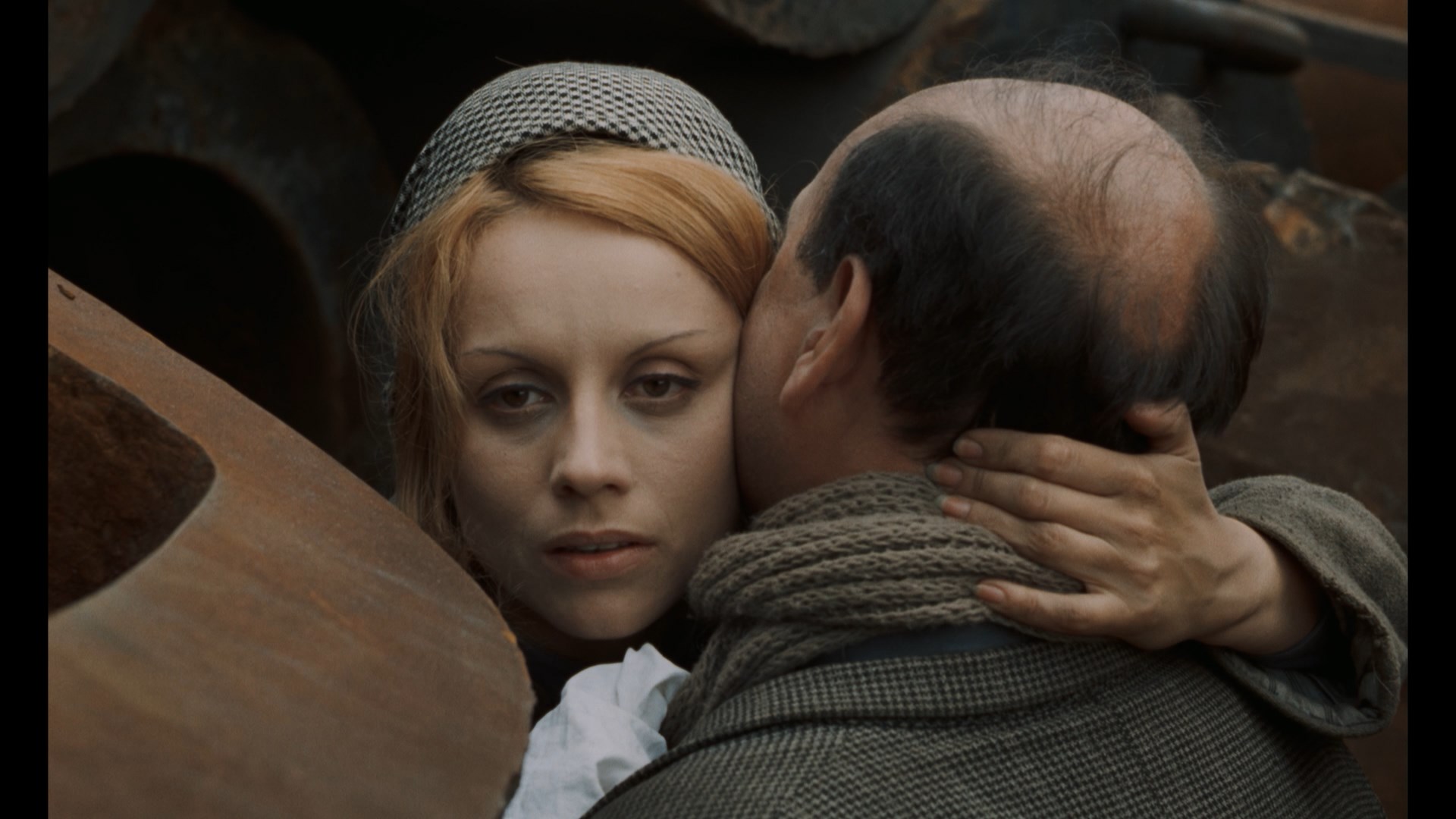 with the women doing virtually all of the physical work while the men still converse with the traits of their former occupations. Socialist slogans are ironically peppered throughout as the workers are steered in their transformation (or lack thereof) by visits from a union rep or the Minister of Culture while even "happy" regimented practices like marriage get trampled by the
with the women doing virtually all of the physical work while the men still converse with the traits of their former occupations. Socialist slogans are ironically peppered throughout as the workers are steered in their transformation (or lack thereof) by visits from a union rep or the Minister of Culture while even "happy" regimented practices like marriage get trampled by the 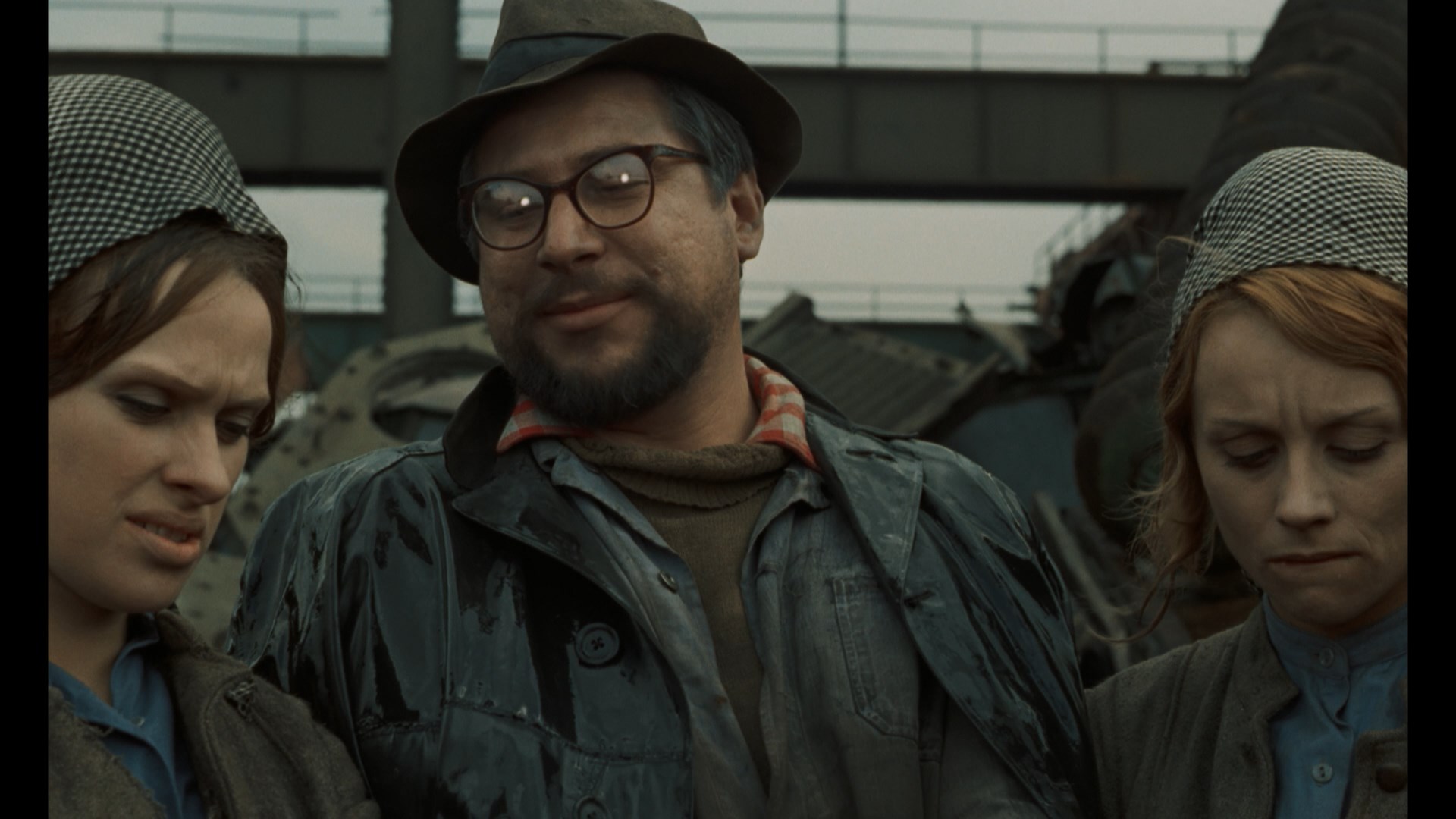 current social order.
current social order.
Anyone familiar with the quirkier side of Czech comedies shouldn't be too surprised by the approach of this fragmented but fascinating film, which is probably not a great intro to Menzel but essential viewing if you've already watched the basics. The cast is packed with familiar faces like The Cremator's Hrusínský, Closely Watched Trains' Brodský and Neckár, and Who Wants to Kill Jesse?'s Zelenohorská, all doing a skillful job of maintaining the film's humorous tone without the sacrificing the underlying critique. This was also one of the earlier Czech films to integrate a bit of nudity, albeit of a chaste nature (with some racier content sprinkled elsewhere throughout). However, it was the jabs at the current government that ended up landing this film in hot water and necessitating its complete unavailability anywhere apart from a VHS bootleg copy that snuck out in the '80s.
One of the earlier opportunities to see this film outside of its theatrical screenings came in 2011 with Second Run's U.K. DVD (the first English-friendly DVD out there), which eventually saw an upgrade in 2022 with their Blu-ray taken from a fresh and quite impressive 4K restoration from the Czech National Film Archive. The restoration here is better than the DVD with the censored footage reinstated more smoothly with consistent color timing, and you can really barely tell at this 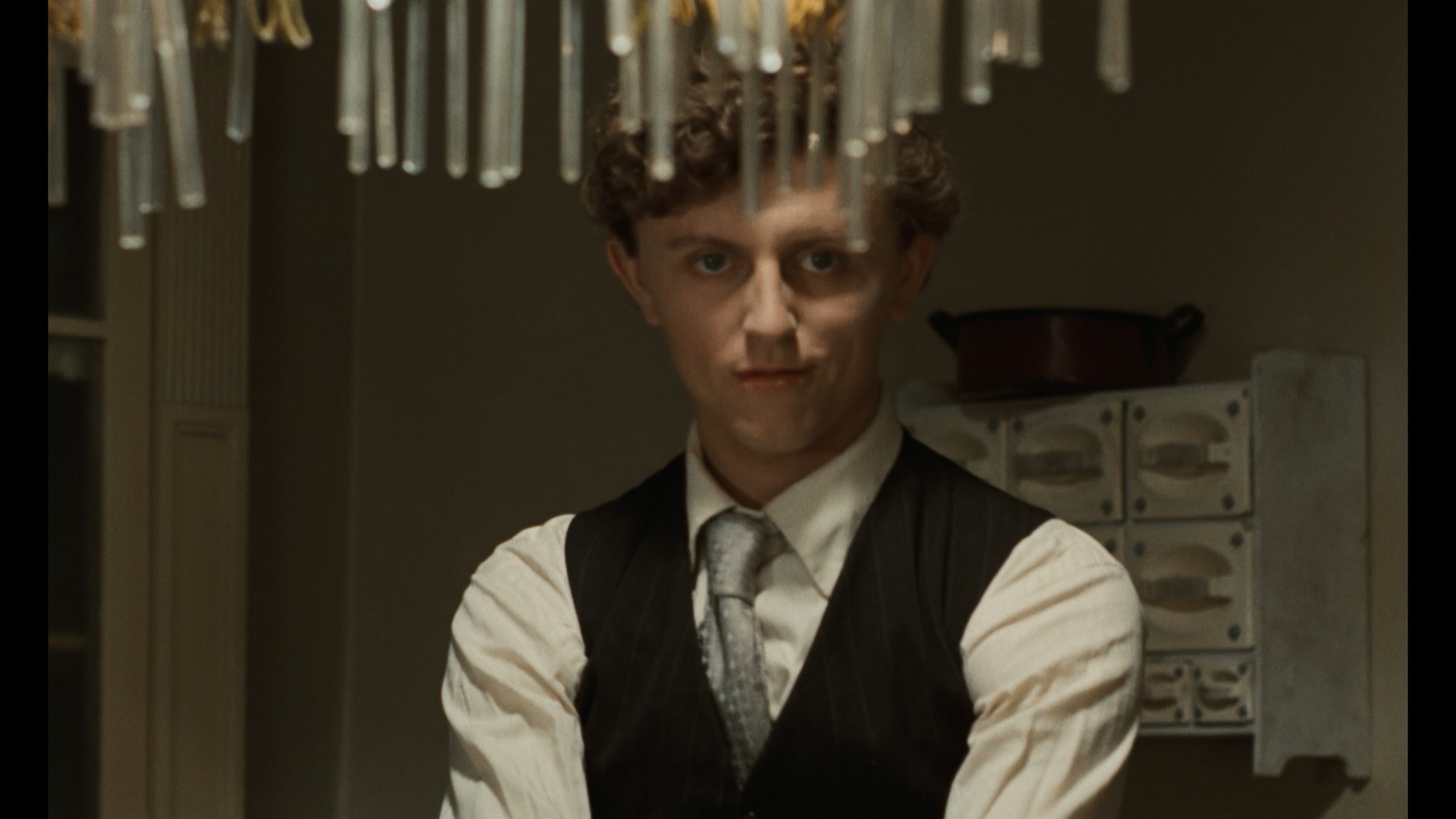 point. It's a visually drab film in terms of color, but the detail here looks great throughout. The LPCM Czech mono track with optional English subtitles is also pristine. A new audio commentary by The Projection Booth podcast's Mike White and Jonathan Owen is a thorough overview of the film including the political change in the weather at the time, the major bit that was
point. It's a visually drab film in terms of color, but the detail here looks great throughout. The LPCM Czech mono track with optional English subtitles is also pristine. A new audio commentary by The Projection Booth podcast's Mike White and Jonathan Owen is a thorough overview of the film including the political change in the weather at the time, the major bit that was 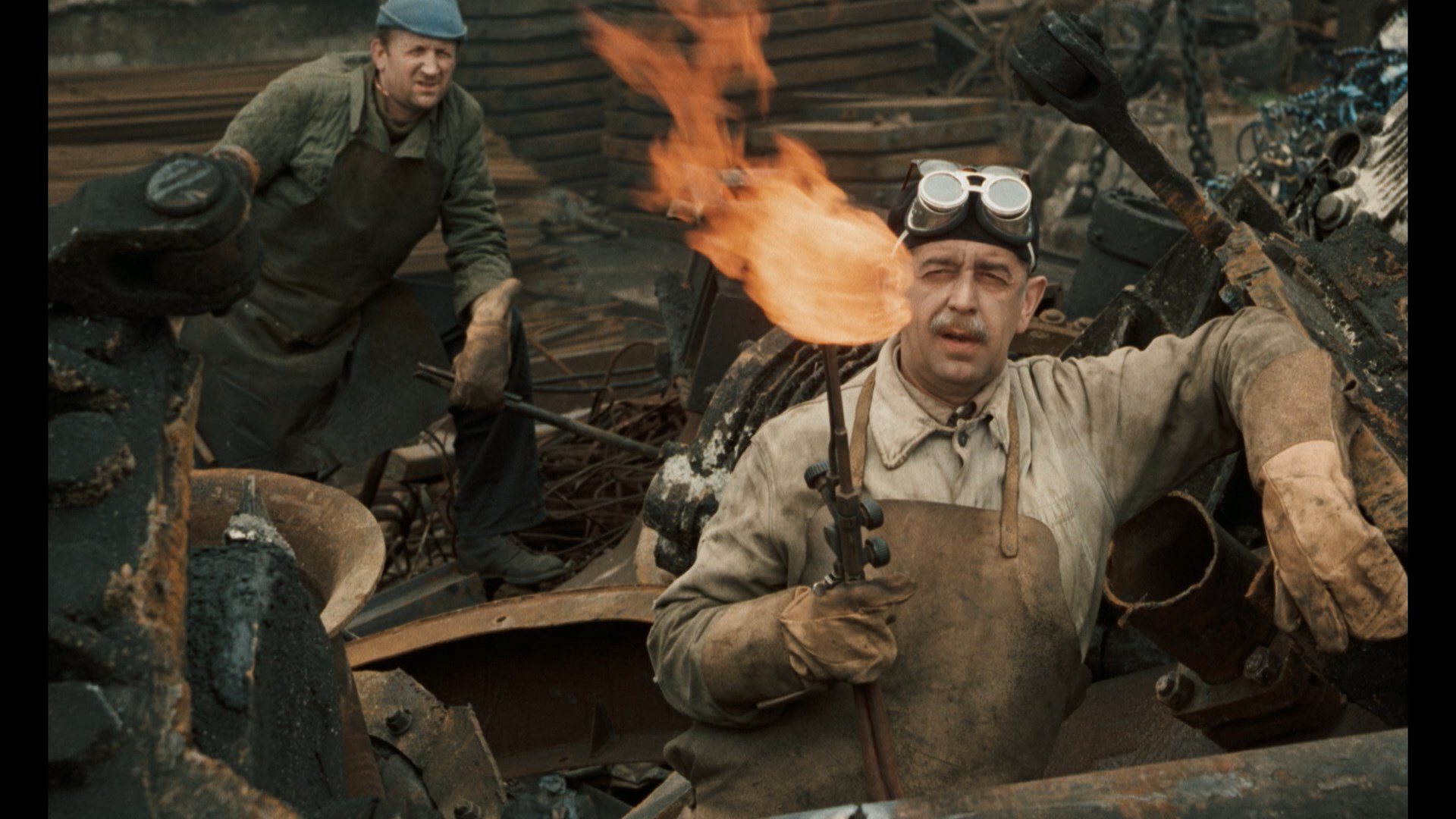 initially cut out in its entirety, the various actors connected to the director, and the interesting choices in some of the casting that went against expectations. Ported over from the DVD is "Jiří Menzel: 7 Questions" (10m7s), a 2011 session with the director addressing the camera about the film's very belated release and acclaim, his collaborations with Hrabal, and the current state of the world and cinema versus the past. Menzel also appears for a discussion (well, more of a monologue with occasional off-camera interjections) with filmmaker Shivendra Singh Dungarpur (9m48s) about his entire career and his thoughts on the Czech film industry. Finally 1963's Our Dear Mister Foerster Died (15m24s) is an early Menzel short film balancing the somber and the wry as a village reacts in a wide spectrum of ways to the death of its famous native composer. This one's also been given a painstaking restoration and looks superb; a newly created trailer is also included, while the 20-page booklet features an intro by cinematographer Jaromír Šofr and an essay by Peter Hames featuring some great insights about the parallel careers of Menzel and Hrabal.
initially cut out in its entirety, the various actors connected to the director, and the interesting choices in some of the casting that went against expectations. Ported over from the DVD is "Jiří Menzel: 7 Questions" (10m7s), a 2011 session with the director addressing the camera about the film's very belated release and acclaim, his collaborations with Hrabal, and the current state of the world and cinema versus the past. Menzel also appears for a discussion (well, more of a monologue with occasional off-camera interjections) with filmmaker Shivendra Singh Dungarpur (9m48s) about his entire career and his thoughts on the Czech film industry. Finally 1963's Our Dear Mister Foerster Died (15m24s) is an early Menzel short film balancing the somber and the wry as a village reacts in a wide spectrum of ways to the death of its famous native composer. This one's also been given a painstaking restoration and looks superb; a newly created trailer is also included, while the 20-page booklet features an intro by cinematographer Jaromír Šofr and an essay by Peter Hames featuring some great insights about the parallel careers of Menzel and Hrabal.
Reviewed on July 31, 2022



 leading light among the Czech New Wave thanks to his Oscar-winning 1966
leading light among the Czech New Wave thanks to his Oscar-winning 1966  classic Closely Watched Trains, filmmaker Jiří Menzel fell afoul of local authorities like many of his peers at the end of the decade. A satirical look at the more pulverizing aspects of Communism, Larks on a String was a victim of extremely bad timing in 1969 with the government outright banning it until its eventual official release in 1990 premiering at the Berlin Film Festival. Attempts to cut the film to make it more palatable didn't work, but eventually the fully uncut version was reassembled and has been fully restored to take its place among his body of work with other films like Capricious Summer. This film marked one of multiple Menzel collaborations with writer Bohumil Hrabal, in this case weaving together several of his anti-Stalinist short stories.
classic Closely Watched Trains, filmmaker Jiří Menzel fell afoul of local authorities like many of his peers at the end of the decade. A satirical look at the more pulverizing aspects of Communism, Larks on a String was a victim of extremely bad timing in 1969 with the government outright banning it until its eventual official release in 1990 premiering at the Berlin Film Festival. Attempts to cut the film to make it more palatable didn't work, but eventually the fully uncut version was reassembled and has been fully restored to take its place among his body of work with other films like Capricious Summer. This film marked one of multiple Menzel collaborations with writer Bohumil Hrabal, in this case weaving together several of his anti-Stalinist short stories.  with the women doing virtually all of the physical work while the men still converse with the traits of their former occupations. Socialist slogans are ironically peppered throughout as the workers are steered in their transformation (or lack thereof) by visits from a union rep or the Minister of Culture while even "happy" regimented practices like marriage get trampled by the
with the women doing virtually all of the physical work while the men still converse with the traits of their former occupations. Socialist slogans are ironically peppered throughout as the workers are steered in their transformation (or lack thereof) by visits from a union rep or the Minister of Culture while even "happy" regimented practices like marriage get trampled by the  current social order.
current social order. point. It's a visually drab film in terms of color, but the detail here looks great throughout. The LPCM Czech mono track with optional English subtitles is also pristine. A new audio commentary by The Projection Booth podcast's Mike White and Jonathan Owen is a thorough overview of the film including the political change in the weather at the time, the major bit that was
point. It's a visually drab film in terms of color, but the detail here looks great throughout. The LPCM Czech mono track with optional English subtitles is also pristine. A new audio commentary by The Projection Booth podcast's Mike White and Jonathan Owen is a thorough overview of the film including the political change in the weather at the time, the major bit that was  initially cut out in its entirety, the various actors connected to the director, and the interesting choices in some of the casting that went against expectations. Ported over from the DVD is "Jiří Menzel: 7 Questions" (10m7s), a 2011 session with the director addressing the camera about the film's very belated release and acclaim, his collaborations with Hrabal, and the current state of the world and cinema versus the past. Menzel also appears for a discussion (well, more of a monologue with occasional off-camera interjections) with filmmaker Shivendra Singh Dungarpur (9m48s) about his entire career and his thoughts on the Czech film industry. Finally 1963's Our Dear Mister Foerster Died (15m24s) is an early Menzel short film balancing the somber and the wry as a village reacts in a wide spectrum of ways to the death of its famous native composer. This one's also been given a painstaking restoration and looks superb; a newly created trailer is also included, while the 20-page booklet features an intro by cinematographer Jaromír Šofr and an essay by Peter Hames featuring some great insights about the parallel careers of Menzel and Hrabal.
initially cut out in its entirety, the various actors connected to the director, and the interesting choices in some of the casting that went against expectations. Ported over from the DVD is "Jiří Menzel: 7 Questions" (10m7s), a 2011 session with the director addressing the camera about the film's very belated release and acclaim, his collaborations with Hrabal, and the current state of the world and cinema versus the past. Menzel also appears for a discussion (well, more of a monologue with occasional off-camera interjections) with filmmaker Shivendra Singh Dungarpur (9m48s) about his entire career and his thoughts on the Czech film industry. Finally 1963's Our Dear Mister Foerster Died (15m24s) is an early Menzel short film balancing the somber and the wry as a village reacts in a wide spectrum of ways to the death of its famous native composer. This one's also been given a painstaking restoration and looks superb; a newly created trailer is also included, while the 20-page booklet features an intro by cinematographer Jaromír Šofr and an essay by Peter Hames featuring some great insights about the parallel careers of Menzel and Hrabal.